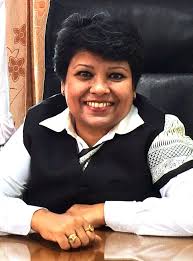Though even after 75 years of Independence the representation of women both at the Bar and the Bench has been meagre, we have numerous examples of women who have fought all odds to emerge as a winner in this male-dominated profession and who have made a name for themselves. This column is an ode to such fighters.

JUSTICE SHAMPA SARKAR
Born on February 18, 1968, Justice Shampa Sarkar graduated with Honours in English from Loreto College, Kolkata in the year 1989, and in Law from the North Bengal University in the year 1992, with First class along with Gold Medal.
Justice Sarkar enrolled as an Advocate on January 29, 1993, and practiced in the High Court of Calcutta, primarily in the Constitutional, Civil and Criminal sides with more emphasis on Writ matters. She appeared on behalf of many authorities, viz., Universities, Municipal Corporations including Revenue authorities as the Junior Standing Counsel.
Justice Sarkar was elevated to the Bench of the High Court of Calcutta as an Additional Judge on March 12, 2018, and was appointed as a Permanent Judge of the Calcutta High Court on February 12, 2020.
Notable Judgments
In May 2023, while observing that the mother of an accused has a right to approach the constitutional court for the protection of the right to dignity and personal liberty guaranteed to her son under Article 21 of the Constitution of India, a Single Judge Bench of Justice Sarkar held: “The Court can mould the relief and award compensation to the affected parties for various lapses and for failure of the State to uphold the dignity and personal liberty of an individual, as enshrined in Article 21 of the Constitution.”
In June 2023, while reiterating the golden rule that the provision of a pensionary law being beneficial to a homogenous class of pensioners should be interpreted liberally in their favour, a three-judge Bench of Justice Harish Tandon, Justice Shampa Sarkar, and Justice Rabindranath Samanta held: “The benefit of family pension can be extended to unmarried/widowed daughter of an employee who superannuated or died prior to coming into force of the Death-cum-Retirement Benefit Scheme, 1981, which came into effect on and from 1st April, 1981.”
In October 2023, a Single Judge Bench of Justice Sarkar, in a revisional application challenging the trial court’s order which allowed the application for substitution of legal representative of the deceased plaintiff based on a registered Will, opined that an executor has the authority to represent the estate of the deceased, and the onus is on the respondent to prove his right to maintain the suit.
In November 2023, the Calcutta High Court made an observation concerning the inequity associated with the issuance of ex-parte orders within the matrimonial proceedings. These orders, rendered without an opportunity for both parties to present their case, carry the potential for substantial societal, financial, and emotional consequences, as observed by Justice Sarkar. “An ex-parte decision in the matrimonial suit would be unjust. Such decision would not only have a social impact but also a financial and a strong emotional impact.”








